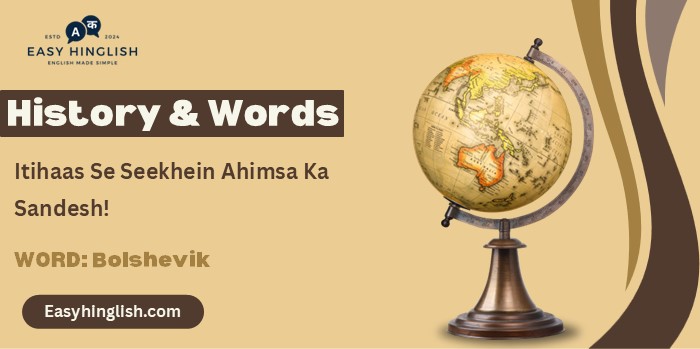History & Words: 'Bolshevik' (November 7)
Welcome to 'History & Words.' Main Prashant hoon, Wordpandit aur Learning Inc. Network ka sansthapak. Yeh series meri bhasha seekhne ki lagan aur itihas ke prati ruchi ka sangam hai. Har kadi ek shabd aur uss se judi ek tithi par roshni daalti hai, jisse aapka shabdkosh badhta hai aur aap itihas ko gehraai se samajh paate hain. Aaiye, iss safar mein shabdon ke madhyam se samay mein pichhe chalein.
🔍 Word of the Day: Bolshevik
Pronunciation: /ˈbɒlʃəvɪk/ (BOL-she-vik)
🌍 Parichay (Introduction)
7 November 1917 ki raat St. Petersburg mein history ka sabse dramatic political takeover shuru hua. Winter Palace pe armed revolutionaries ka storm, Tsar ki government ka complete collapse, aur Vladimir Lenin ki return to power – yeh sab Bolshevik Revolution ka part tha jo duniya ko forever change kar dene waala tha. Actually, Russian calendar ke according yeh October 25 tha, isliye ise "October Revolution" bhi kehte hain.
Bolshevik – yeh word sirf ek political party ka naam nahi tha, balki radical change aur revolutionary ideology ka symbol ban gaya. "Bolshevik" literally "majority" mean karta hai, though ironically yeh initially minority faction tha. Lekin November 7th ke baad, yeh minority ne largest country in the world ko control kar liya aur communist ideology ko global stage pe establish kiya.
Iss din ke baad duniya do camps mein divide ho gayi – capitalist West aur communist East. Cold War, space race, nuclear arms competition – sab kuch ka origin November 7, 1917 mein trace kar sakte hain. Bolshevik Revolution ne prove kiya ki organized minority proper strategy ke saath entire political system ko overthrow kar sakti hai.
🌱 Shabd ka Utpatti (Etymology)
"Bolshevik" Russian word "bolshinstvo" se derive hua hai, jiska literal meaning "majority" hota hai. "Bolshe" means "more" aur "-vik" suffix "person" indicate karta hai. Yeh term 1903 mein Russian Social Democratic Labor Party ke split ke time originate hua.
Ironically, Vladimir Lenin ke followers actually minority the when they adopted yeh naam. 2nd Party Congress mein voting ke time briefly majority mili thi on some procedural issues, isliye "Bolshevik" (majority) label adopt kar liya. Opposing faction ko "Menshevik" (minority) kaha gaya. Yeh naming strategy pure propaganda tha – psychological advantage lene ke liye.
Time ke saath Bolshevik word revolutionary extremism aur authoritarian communism ka synonym ban gaya. "Bolshevization" term use hota tha other communist parties ko Lenin's model follow karne ke liye pressure daalne ke context mein.
📖 Mahatvapurn Shabdavali (Key Vocabulary)
- 🔑 Proletariat: Working class jo capitalists ke liye labor provide karta hai
- 🔑 Bourgeoisie: Middle aur upper class jo means of production own karta hai
- 🔑 Vanguard Party: Professional revolutionaries ka organized group
- 🔑 Dictatorship of the Proletariat: Workers ka temporary authoritarian rule
- 🔑 Marxism-Leninism: Communist ideology ka Bolshevik interpretation
- 🔑 Soviets: Workers' councils jo revolutionary government represent karte the
🏛️ Itihasik Sandarbh (Historical Context)
Russian Empire 1917 mein complete crisis mein tha. World War I mein massive casualties, economic collapse, aur Tsar Nicholas II ki incompetent leadership ne revolutionary conditions create kar diye the. February Revolution mein Tsar abdicate kar chuka tha, lekin Provisional Government weak aur unpopular thi.
Lenin ka return April 1917 mein "sealed train" se Germany ke through ek game-changer tha. Unka "April Theses" clear agenda set karta tha: "Peace, Land, and Bread" – exactly woh promises jo Russian people chahte the. Provisional Government war continue kar rahi thi, land reform delay kar rahi thi, aur food shortage handle nahi kar pa rahi thi.
Leon Trotsky ne Military Revolutionary Committee organize ki jo Red Guards control karti thi. Yeh essentially Bolshevik private army thi jo key strategic points capture karne ke liye ready thi. Planning aur coordination exceptional tha – ek disciplined minority ne chaotic majority ko outmaneuver kiya.
International context bhi important tha. European socialist parties WWI support kar rahe the, jo Second International ko discredit kar deta tha. Lenin ka anti-war stance aur revolutionary defeatism ka theory globally attractive tha socialist movements ke liye. German funding allegations bhi the, though extent debatable hai.

⏳ Samayrekha (Timeline)
- 1903: Russian Social Democratic Party splits, Bolshevik/Menshevik divide
- 1905: First Russian Revolution, failed attempt
- March 1917: February Revolution, Tsar abdicates
- April 1917: Lenin returns, April Theses published
- July 1917: Failed Bolshevik uprising, Lenin flees
- 7 Nov 1917: October Revolution begins, Winter Palace captured
- 1918–1921: Russian Civil War, Bolsheviks vs. Whites
- 1922: Soviet Union officially established
🌟 Is Din ka Mahatva (The Day's Significance)
7 November 1917 ki raat 2:10 AM pe Aurora cruiser ne Winter Palace pe blank shot fire kiya – yeh October Revolution ka official signal tha. Red Guards aur revolutionary sailors ne systematically government buildings, telephone exchanges, railway stations capture kar liye. Military strategy textbook example tha – key infrastructure control kar ke entire city paralyze kar diya.
Provisional Government ke ministers Winter Palace mein trapped the, defended by women's battalion aur some military cadets. Defense weak tha kyunki most army units already Bolsheviks ko support kar rahe the ya neutral ho gaye the. Alexander Kerensky (Prime Minister) city se escape kar gaya, government collapse inevitable tha.
Lenin jo months se hiding mein tha, Smolny Institute (Bolshevik headquarters) mein appeared kiya aur immediately new government formation announce kar diya. "All power to the Soviets" slogan practical reality ban gaya. Council of People's Commissars form hui Lenin ke leadership mein.
Surprisingly, immediate resistance minimal tha. St. Petersburg (then Petrograd) mein normal life continue raha – trams running, shops open, theaters operating. Most people initially yeh as another government change treat kar rahe the, not realizing ki yeh world history change kar dene waala moment hai.
International reaction mixed tha. Allied powers worried the kyunki Bolsheviks anti-war the aur separate peace with Germany likely tha. Wilson, Lloyd George, Clemenceau sabko communist ideology se threat feel hota tha. Intervention plans immediately shuru ho gaye.
💬 Prasiddh Ukti (Quote)
"The capitalists will sell us the rope with which we will hang them."
— Vladimir Lenin
🔮 Aaj Ka Matlab aur Chintan (Modern Usage and Reflection)
Aaj "Bolshevik" word mostly historical context mein use hota hai, lekin iska political implications still relevant hain. Right-wing politicians often "Bolshevik tactics" ka reference dete hain organized left-wing movements ko discredit karne ke liye. "Cultural Bolshevism" term conservative discourse mein appear karta hai.
Revolutionary movements worldwide ne Bolshevik model study kiya hai. Chinese Communist Party, Cuban Revolution, Vietnamese independence movement – sabne Lenin ke vanguard party concept adapt kiya. Organized minority with clear ideology aur disciplined structure ka principle globally influential raha hai.
Modern authoritarian movements – both left and right – mein Bolshevik characteristics observe kar sakte hain: centralized leadership, ideological purity, opposition suppression, propaganda machinery. Putin's Russia ironically tsarist nostalgia promote karta hai but power consolidation methods distinctly Bolshevik hain.
🏛️ Virast (Legacy)
Soviet Union ka 70-year existence completely Bolshevik Revolution ka result tha. Space program, nuclear weapons, Cold War, decolonization movements – sab pe direct impact tha. Eastern Europe, China, Cuba, Vietnam – multiple countries mein communist governments establish hue Bolshevik inspiration se.
Ideological legacy bhi profound hai. Class struggle, workers' rights, anti-imperialism ke concepts global political discourse mein mainstream hain. Labor unions, social democratic parties, welfare states – sabmein Bolshevik influence trace kar sakte hain, even in capitalist countries.
Negative legacy bhi significant hai. Stalinist purges, Gulag system, authoritarian control ne human rights violations ki precedent set ki. "Communist" dictatorships worldwide ne Bolshevik model ko justify karne ke liye use kiya, though original ideology se deviation bhi tha.
🔍 Tulnatmak Vishleshan (Comparative Analysis)
1917 mein Bolshevik Revolution ko "proletarian revolution" ke roop mein project kiya gaya tha. Marxist theory ke according, industrialized countries mein workers' revolution hona chahiye tha. Lekin Russia predominantly agricultural tha, aur industrial working class minority mein tha.
Aaj hum jaante hain ki Bolshevik Revolution primarily political coup tha jo popular support ka advantage leke weak government overthrow kar diya. Democratic mandate questionable tha – Constituent Assembly elections mein Bolsheviks lose kar gaye the aur assembly dissolve kar di.
Contemporary revolutions – Arab Spring, Color Revolutions, Maidan – mein mass participation aur democratic aspirations clearly visible hain. Social media, global connectivity ne revolutionary dynamics change kar diye hain. Decentralized movements vs centralized party control ka contrast clear hai.
💡 Kya Aapko Pata Hai? (Did You Know?)
🎓 Antim Vichar (Conclusion)
Bolshevik Revolution ne prove kiya ki organized minority proper timing aur strategy ke saath entire political system transform kar sakti hai. November 7, 1917 ka din 20th century ki defining moment tha – capitalism vs communism ki ideological battle ka starting point.
Aaj globalized world mein Bolshevik-style revolutions unlikely hain, lekin lessons relevant rehte hain. Political organization, ideological clarity, strategic planning – yeh elements successful movements ki common characteristics hain. Democracy aur authoritarianism ke beech ka tension, jo November 7th se shuru hua, aaj bhi continue hai.
📚 Aage Padhne Ke Liye (Further Reading)
- 📘 Ten Days That Shook the World – John Reed
- 📗 The Russian Revolution – Sheila Fitzpatrick
- 📙 Red Victory: A History of the Russian Civil War – W. Bruce Lincoln








